- Home
- Peter Straub
In the Night Room Page 2
In the Night Room Read online
Page 2
Willy drove the rest of the way home in a complicated mixture of relief and bright panicky alarm. Very narrowly, she had escaped craziness.
5
hard death hard
More than a little creeped out, Tim stared at the message on his screen. Narym had joined in with Huffy, presten, and the others to disrupt a stranger’s day with what was either a joke or a threat. If it was supposed to be a joke, the disruption had been hideously mistimed. A little more than a year earlier, Tim’s nephew, Mark, his brother’s son, had vanished utterly from the face of the earth. Tim still felt the boy’s loss with the original sick, vertiginous sharpness. His grief had only deepened, not lessened. How greatly he had loved Mark he understood only after it was too late to demonstrate that love. Hard death hard, yes, hard on the survivors.
Tim had wanted to bring his nephew to New York City and advance his education by showing him a thousand beautiful things, the Vermeers at the Frick, an opera at the Met, little hidden corners of the Village, the whole rough, lively commerce of the street. He had wanted to be a kind of father to the boy, and if he could have seen Mark enrolled at Columbia or NYU, he would have been a better father than Philip ever was. Instead, after watching his brother almost immediately abandon hope for his son’s survival, Tim had written a novel that permitted Mark the continued life a monster named Ronald Lloyd-Jones had stolen from him—in lost boy lost girl, to be published in a week, Mark Underhill slipped away into an “Elsewhere” with a beautiful phantom named “Lucy Cleveland,” in reality Lily Kalendar, the daughter of a second homicidal monster, Joseph Kalendar. She had almost certainly died at her father’s hands sometime in her fifth or sixth year, although as with Mark, no remains were ever found. In Tim’s imagination, the two of them, the lost boy and the lost girl, had escaped their fates by fleeing into another world altogether, a world with the potentiality of cyberspace, where they ran hand in hand along a tropical beach below a darkening sky, conscious always of the Dark Man hurrying after them. Better that for his dear nephew, better by far, than monstrous Ronnie Lloyd-Jones’s attentions.
There had to be a Dark Man, for otherwise nothing in their world would be real, least of all them.
Tim had known about the Dark Man since the day his older sister, April, had been murdered in an alleyway alongside the St. Alwyn Hotel and he, dimly seeing it happen and running toward her, was mowed down by a passing car on Livermore Avenue. Before thirty seconds had ticked away, April was dead, and he, too, had passed out of life. He seemed to be following her into a realm where darkness and light inhabited the same dazzling space. Then a sturdy, unexpected cord yanked him back into his mutilated body, and his education really took off.
His brother claimed not to remember anything about April, which may have been the truth. Mom and Pop never spoke of her, though from time to time Tim could see the subject of his sister’s death glide into form between them, like a giant cloud both his parents pretended not to see. Could Philip have missed it altogether, their stifled grief? April had been nine at the time of her death, Tim seven. Philip had been three, so maybe he really did have no conscious memory of their sister. On the other hand, Philip possessed a massive talent for denial.
If Tim had ever thought he could forget April, her recurring ghost would soon have let him know otherwise. A year after her death, he had seen her seated four rows behind him on the Pulaski Avenue bus, her face turned to a window; three years later, he and his mother bunking off on the Lake Michigan ferry, Tim had looked down and with a gasp of shock and sorrow seen his sister’s blond head tilted over the railing at the squared-off aft end of the lower deck. Later, he had seen her outside a grocery store in Berkeley, where he had been a student; on a truck with a lot of uniformed nurses in Camp Crandall, Vietnam, where he had been a pearl diver on the body squad; twice riding by in taxicabs, in New York, where he lived; and twice again in the first-class sections of airplanes, when he had been having a nice little drink.
On all but one of these occasions, Tim had understood that for a brief moment desire had transformed a convenient female child into his sister; but there had been no little girls in Camp Crandall. In Camp Crandall, the daily task of rummaging through ruined corpses in search of ID had affected Tim’s consciousness in a number of extravagant ways, likewise the enforced proximity to elaborately fucked-up grunts with names like Ratman and Pirate. There he had witnessed what he took to be the only true hallucination of his life.
Until this morning. What he had seen across the street from the Fireside Diner on West Broadway had to be a hallucination, for it could be nothing else. Without benefit of sound effects or a premonitory shift in the lighting, nine-year-old April Underhill had abruptly entered his field of vision. She was wearing an old blue-and-white thing she called her Alice in Wonderland dress. At the time of her death, Tim remembered, April had been obsessed with Alice’s Adventures in Wonderland and Through the Looking-Glass, and she’d had on that crazy dress because she usually refused to wear anything else. Now she faced him, her stare like a shout in the crowded street. Limp blond hair in need of washing, the bodice of the Alice dress darkened with raindrops, a figure so distant from her proper time she should have been in black and white, or two-dimensional—this apparition struck him like a bolt of lightning and left him sizzling where he stood.
Two stubble-faced boys wearing black swerved to move around him.
For a time he was incapable of speech. He could tell himself, April isn’t really there, I’m hallucinating, but what he was looking at seemed and felt like fact. Long-forgotten things returned laden with the gritty imperfections of the actual person his sister had been. The characteristic note of April’s nine-year-old life had been frustration, he saw: she had the face of a child who, having grown used to being thwarted, was in a furious hurry to reach adulthood.
April’s stubborn face, with its implacable cheekbones and tight mouth, reminded Tim of Pop’s uncomprehending rages at what he perceived as April’s defiance. No wonder she had fled into the mirror world of Alice and the Mad Hatter. A tavern-haunting elevator operator at the St. Alwyn Hotel supervised her life, and he found half of the things that ran through her mind unacceptable, irritating, obscurely insulting.
A second and a half later Tim was left with the fact of April’s face, narrower than he remembered, and the smallness of her body, the true childishness of the sister he had lost. All his old love for nine-year-old April Underhill awakened in him—she who had defended him when he needed defending, stuck up for him when he needed a champion, entranced him with the best stories he had ever heard. She, he realized, she should have been the writer! April had been his guide, and to the end. On her last day, she had preceded him into the ultimate Alice-world, the one beyond death, where, unable any longer to follow his best, bravest, and most tender guide all the way to her unimaginable destination, he had yielded to the forces pulling him back.
He wanted to tell her to get out of the rain.
April stepped forward on the crowded sidewalk, and Tim’s heart went cold with terror. His sister had swum back through the mirror to interrupt him on his way to breakfast. He feared that she intended to glide across the street, grasp his hand, and pull him into the SoHo traffic. She reached the edge of the pavement and raised her arms.
Oh no, she’s going to call to me, he thought, and I’ll have to go.
Instead of dragging him through the mirror, April brought her hands to the sides of her mouth, leaned forward, contracted her whole being, and, as loudly as she could, shouted through the megaphone of her hands. All Tim heard were the sounds of the traffic and the scraps of conversation spoken by the people walking past him.
His eyes stung, his vision blurred. By the time he raised his hands to flick away his tears, April had disappeared.
6
Guilderland Road, at the upper end of which lay Mitchell Faber’s expansive, densely wooded property, traversed an area on the southwestern slopes (so to speak) of Alpine, New Jersey, whe
re not long after the Civil War the nearly invisible village of Hendersonia had been surgically detached from the more public borough of Creskill. In all aspects of life save the naming of places, the Hendersons of Hendersonia had presumably cherished obscurity as thoroughly as Mitchell Faber, for they had passed through history leaving behind no more than a scattering of barely legible headstones in the postage-stamp graveyard at the lower end of the road. Farther down the hill, the cement-block bank, an abandoned Presbyterian church, a private house turned into an insurance agency, a video and DVD rental shop, and a bar and grill called Redtop’s made up the center of town. The previous summer, a Foodtown grocery store had taken over an old bowling alley in a paved lot one block south, and Willy promised herself that from now on she would do her shopping there.
She was still finding her way around, still trying to get into a routine. It had been only two weeks since Mitchell had succeeded in persuading her to abandon her cozy one-bedroom apartment on East Seventy-seventh Street for the “estate.” They were to be married in two months, why not start living together now? They were adults of thirty-eight and fifty-two (a young fifty-two), alone in the world. Let’s face it, Mitchell said one night, you need me. She needed him, and he wanted her as extravagantly as someone like Mitchell Faber could ever want anything—dark, frowning Mitchell summoning her into his embrace, promising to make sure the bad things never got close to her again. The “estate” would be perfect for her, he said, a protective realm, as Mitchell himself was a kind of protective realm. And large enough to provide separate offices for both of them, because he wanted to spend more time at home and she needed what all women, especially women who wrote books, needed: A Room of Her Own.
When Willy had met Mitchell Faber, he amazed her by knowing not only that her third YA novel, In the Night Room, had just won the Newbery Medal, but also that its setting, Mill Basin, was based on the city where she had been born, Millhaven, Illinois.
The prize had been announced four days earlier, but the party at Molly Harper’s apartment was not in her honor, and Willy’s triumph was so fresh, as yet still half unreal, that she felt as though it might be revoked. Willy herself, having yet to emerge from mad grieving darkness, would have run from anything as public as a celebration. She felt only barely capable of handling a dinner party. Some of the people present were aware that Willy had just been honored by the Newbery Committee, and some of those came up to congratulate her. Molly’s friends tended to be too rich to be demonstrative; like Molly herself, many of the women were decades younger than their husbands, thereby generally obliged to exercise a kind of behavioral modification akin to the pushing of a “Mute” button. Added to their characteristic restraint was their response to Willy’s appearance, that of a gorgeous lost child. Some women disliked her on sight. Others felt threatened when their husbands wandered, flirtatiously or not, into Willy’s orbit.
Toward the end of the evening, or shortly after ten o’clock, for these silver-haired men and their gleaming wives never stayed up later than eleven, Lankford Harper, Molly’s whispery husband, left the chair to Willy’s left and within seconds was replaced by a sleek, smooth male animal remarkable for being older than most of the women and younger than all of the men. Energy hummed through his thick, shiny black hair and luxuriant black mustache. Black eyes and brilliant white teeth shone at Willy, and a wide, warm dark hand covered hers. That she did not find this intimacy discomfiting amazed her. Whatever was about to happen, would; instead of feeling offended, Willy relaxed.
—I want to congratulate you on your magnificent honor, Mrs. Patrick, the man said, leaning in. You must feel as though you’ve won the lottery.
—Hardly that, she said. Do you keep up with children’s books then, Mr. . . . ?
—I’m Mitchell Faber. No, I can’t say I’m an expert on children’s books, but the Newbery’s a great accolade, and I have heard wonderful things about your book. Your third, isn’t it?
She opened her mouth. —Yes.
—Good title, In the Night Room, especially for a children’s book.
—It’s probably too close to Maurice Sendak, but he was writing for a younger audience. Why am I explaining myself to this guy? she wondered.
His hand tightened on hers. —Please excuse me for what I’m about to say, Mrs. Patrick. I knew your husband. At times, our work brought us into contact. He was a fine, fine man.
For a moment, Willy’s vision went grainy, and her heart hovered between beats. Ordinary conversation hummed on around her. She blinked and raised her napkin to her mouth, buying time.
—I’m sorry, the man said. I did that very badly.
—Not at all. I was just a bit startled. Do you work for the Baltic Group?
—From time to time, they call me in to make murky issues even murkier.
—I’m sure you bring clarity wherever you go, she said, and, in a way she hoped brought the conversation to a neat conclusion, thanked him for having approached her.
Mitchell Faber leaned in and patted her hand. —Mill Basin, the village in your book. Is it based on Millhaven? I understand that’s where you’re from.
Mitchell Faber was chockablock with little astonishments.
Flattered, puzzled, she smiled back at him. —You must know Millhaven very well. Are you from there, too?
The question was absurd: Faber did not look, sound, or behave like a Millhaven native. Nor was he a product of the East Coast privilege-hatcheries responsible for Lankford Harper.
—Sometimes when I’m in Chicago I like to drive up to Millhaven, check in to the Pforzheimer for a night or two, wander along the river walk, have a drink in the old Green Woman. Do you know the Green Woman Taproom?
She had never heard of the Green Woman Taproom.
—Lovely old bar, fascinating history. Ought to be in encyclopedias. It has an interesting connection to criminal lore.
Criminal lore? She had no idea what he was talking about, and no intention of finding out. As far as Willy was concerned, the murders of her husband and daughter were more than enough crime for the rest of her life. The very idea of “criminal lore” struck her as a bad idea.
Mitchell Faber could have struck her the same way, but Willy found that she had not made up her mind so quickly. Calling Molly the next day to thank her, she found herself asking her friend about the man who had spoken to her about the Newbery and Millhaven. Molly knew very little about him.
A day later, Willy called to report that the unknown dinner guest had asked if they might get together for a cup of coffee or a drink, or anything.
—I’d go straight for the anything, Molly told her. What have you got to lose? I thought he was pretty cute. Besides, he isn’t a hundred years old.
—I don’t know anything about him, Willy said. And I don’t think I’m ready to start dating. I’m not even close.
—Willy, how long has it been?
—Two years. That’s nothing.
—So’s a cup of coffee.
—I’d have to tell him everything.
—If he works with Lanky, he knows everything already. These guys can find out whatever they want to, they can dig up anything. Lanky told me they’re better than the CIA, and they should be! They have about ten times the money!
—Ah, Willy said. So that’s how Mr. Faber found out about In the Night Room and Millhaven.
—He had Lanky!
—Lanky knows I won the Newbery? Excuse me, I didn’t mean that the way it sounded.
Molly was laughing. —Of course Lanky knows. He even read Night Room.
Now Willy was stunned. —Lanky read my book? It’s a YA!
—YA novels are Lanky’s secret passion. When he was twenty-five years old, he read The Greengage Summer, and it changed his life. Now he’s an expert on Rumer Godden.
Willy tried to picture Molly’s gaunt, secretive, gray-haired husband in his blue pin-striped suit and gold watch, bending, in the light of a library lamp, over a copy of Miss Happiness and Miss Flower.
>
—He has a fabulous collection, Molly said. We’re talking about Lankford Harper now, remember. There’s a special vault with huge metal bookshelves. When you push this little button, they revolve. Thousands of books, most of them in great condition. When he gets a new one, he buys a bunch of copies, one to read and the rest to put in the vault. Philip Pullman—you wouldn’t believe how much those Philip Pullmans are worth.
Willy should have known that Lanky Harper’s interest in her fiction was primarily financial. —How many copies of In the Night Room are stashed away in that vault?
—Five. He bought three when it came out, and as soon as the Newbery was announced, he bought two more.
—Five copies? I guess he liked it a lot. Her mind had returned to Mitchell Faber, whose intrusiveness had contained an unexpected quantity of appeal. At least Faber had been unafraid actually to talk to the tragic widow, instead of swaddling her in clichés. Secretly, dark Mitchell Faber rather thrilled Willy Patrick: he was the kind of man for whom everyone else’s rules were merely guidelines.
7
So there he had been, Tim Underhill, in the good old Fireside, trying to act as though his hands weren’t shaking so badly that the mushrooms fell off his fork; and trying to look as absorbed in the crossword puzzle as he was every other morning. The words kept blurring on the page, and none of the clues made sense; above all, Underhill was trying simultaneously to figure out and ignore whatever his murdered nine-year-old sister had been shouting at him from the other side of West Broadway. Contradictory desires were difficult to fulfill, especially when wrapped in such urgency. April bending forward, shouting at him, bellowing, frantic to get her message across . . .

 Poe's Children: The New Horror: An Anthology
Poe's Children: The New Horror: An Anthology Koko
Koko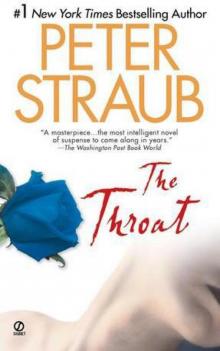 The Throat
The Throat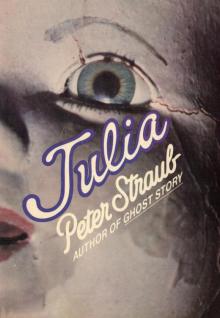 Julia
Julia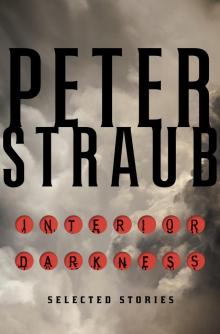 Interior Darkness: Selected Stories
Interior Darkness: Selected Stories A Dark Matter
A Dark Matter Floating Dragon
Floating Dragon Houses Without Doors
Houses Without Doors Mr. X
Mr. X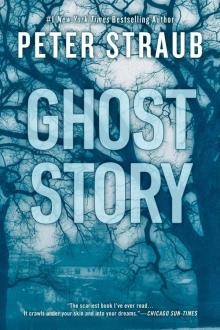 Ghost Story
Ghost Story Mystery
Mystery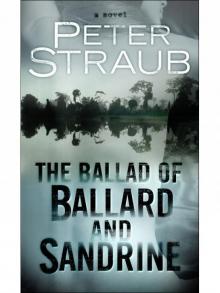 The Ballad of Ballard and Sandrine
The Ballad of Ballard and Sandrine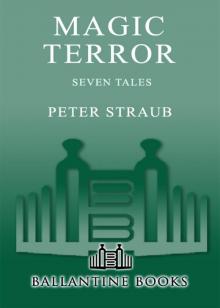 Magic Terror
Magic Terror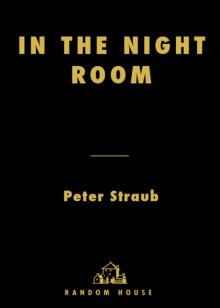 In the Night Room
In the Night Room Lost Boy Lost Girl
Lost Boy Lost Girl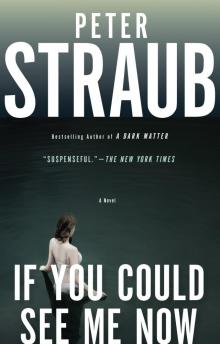 If You Could See Me Now
If You Could See Me Now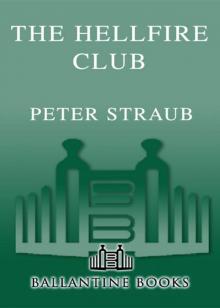 The Hellfire Club
The Hellfire Club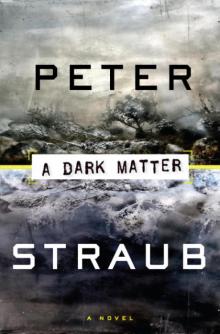 A Dark Matter: A Novel
A Dark Matter: A Novel Koko brt-1
Koko brt-1 Shadowland
Shadowland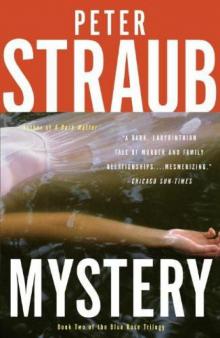 Mystery brt-2
Mystery brt-2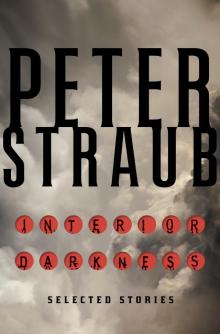 Interior Darkness
Interior Darkness Poe's Children
Poe's Children